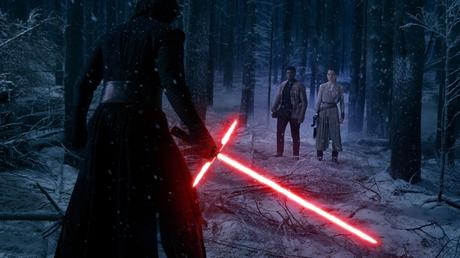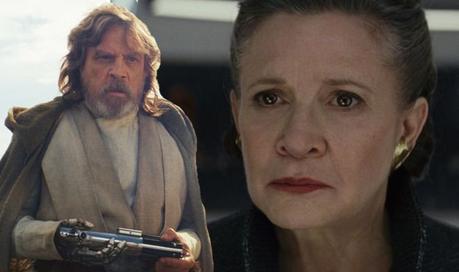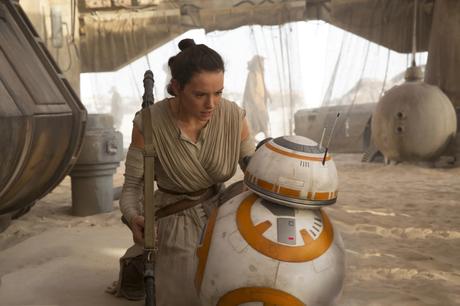
Why must the children suffer for the sins of their parents? Why must they atone for the misdeeds of those who came before?
This is the latter-day Star Wars' Trilogy's major theme: that we cannot, indeed must not, escape the past. We must face that which we fear the most. And by facing this fear, by embracing it, we may overcome the guilt associated with past misdeeds.
We need not pay for, nor are we obliged to accept, our forebearers' failings and/or offenses at face value. Yet, we must accept them. We must acknowledge, too, that they did wrong in committing horrendous acts of unspeakable violence to others and to their person - and, henceforth, make amends.
If this sounds all-too familiar to readers, i.e., words spoken by leader-in-training Paul Atreides from author Frank Herbert's classic Dune saga, you are not mistaken. Producer, director and visionary filmmaker George Lucas relied heavily upon, and was influenced by, Herbert's pathbreaking work, which prefigured prominently in many of Star Wars' themes and locales, even down to its primary protagonist, the convivial Luke Skywalker.

With all that going for it, Star Wars: The Force Awakens, the 2015 reworking of the moneymaking original series, was severely criticized by both fans and critics, along with students of science-fiction filmography, as derivative, repetitive, and a blatant rip-off of, well, better features and practically everything that had come before.
Committing the same if not similarly grievous sins upon the children of those iconic creations, it left viewers wanting. Not just more, but different. In other words, old wine in newer, sleeker, splashier, digitally enhanced bottles made Jack and us viewers "dull boys and girls" indeed.
Putting those negative references to the side and out of harm's way, we can forge ahead, thus freeing ourselves from the shackles of the past to elaborate with renewed vigor on the impact and legacy of the J.J. Abrams reboot.
Concentrating on the surviving protagonists from the Lucas heritage - that is, the aforementioned Master Luke, together with Princess Leia, Han Solo, Chewbacca, Threepio, Artoo, and new characters Rey, Finn, Poe Dameron, and others - this Next Generation formulaic gathering of dueling lightsabers reconstructs the primal urges of families torn apart by past transgressions.
Consequently, the reason why this author, after having taken several years to ponder the perceived wisdom of recapitulating and, hence, reopening old Star Wars wounds, has decided to embark on a reverse Hero's Journey, albeit considerably shortened.
Readers know that, in terms of revisiting the past, they owe much of their accepted knowledge concerning myths and legends to Joseph Campbell's groundbreaking research into those areas. Specifically, we are referring to his acclaimed 1988 PBS series The Power of Myth with journalist Bill Moyers (available on YouTube or online).
I, myself, have been enlightened by Campbell's cogent interpretations and the interconnected parallels he endeavored to draw from within Lucas' sci-fi ethos. These included the shifting faces of heroes and villains embodied in ancient cultures and creeds that existed... long ago and far away.
One comes to the realization that mythology and ritual, as outlined by him, have played an integral part in Campbell's analysis. Through examples and clarifications, one was eager to learn how each civilization's tales of derring do, of romantic adventures and exploration of life and suffering, have meshed with current history in our latter-day longing for better times and better ways of being.
Making sense of the senseless, or the tangled web of politics and religion, was one of many eye-opening discoveries that gave clarity and purpose to previously opaque events.
For further elucidation, one need only examine the three extant versions of the original Star Wars series, which I attempted to do in my multipart series of articles (see the following link: https://josmarlopes.wordpress.com/2013/05/06/star-wars-the-original-series-a-new-hope-for-sci-fi-cinema-as-the-empire-strikes-back-yet-again/?relatedposts_hit=1&relatedposts_origin=2991&relatedposts_position=2), sans those CGI-enhanced extras, of course. They tended to bog the story down considerably and, as such, did relatively little to add value to what had gone before.
The new and improved trio, subtitled variously as The Force Awakens, The Last Jedi (the more, shall we say, "noteworthy" contender in the group), and that dud of duds, The Rise of Skywalker (dubbed by wags as "Skyfall"), all featured sons and daughters, mothers and fathers, even grandparents, at war with or fervently against one another. Talk about a common purpose!
Making up for past transgressions - that is, the alleged wrongs that were done, whether intentional or inadvertent, or through envy and neglect - by way of patricide, or by "cloning," or through ways "some consider to be unnatural," did not give rise to more powerful Jedi, or stronger Sith or, for that matter, insightful leadership.
Instead, the opposing natures of the Force - one that inhabits the clueless but game Rey, the other in feisty Kylo Ren (that's Ben Solo, in reverse order and spelling rearranged), a cantankerous fellow with obvious anger management issues - represent both the Light and the Dark Sides of life.

Will Rey grasp the fact that she must become the inevitable heroine by default? Will Kylo Ren ever come to terms with Papa Han's abandonment, or Mama Leia's guilt over her neglect of her son, or Master Luke's fear of the evil bubbling beneath the surface of his apprentice's boyish mien?
What lessons have they learned? What emotional hills have they climbed? Can they be trusted to wield such a deadly if elegant weapon as a Jedi's lightsaber? Or with the power of the Force? Or that of the Dark Side, "a pathway to many abilities," etc., etc., and so forth? Who is the monster and who is the man? (I hear a song coming...). We can say that of many individuals, can't we?
Tune in, if you must. Only, don't look to us for the answers. Seek and you shall find. Oh, and may the Force be... Uh, never mind.
Copyright © 2022 by Josmar F. Lopes
